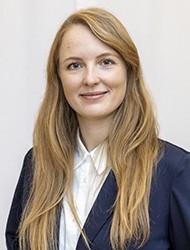Bozhena Kozakevych

Heide Fest
Faculty of Social and Cultural Sciences
Doctoral CandidateSince October 2018, Bozhena Kozakevych has been working as a research assistant at the Chair of Entangled History of Ukraine at the European University Viadrina in Frankfurt (Oder). Her PhD project is on "Jews and Christians: Soviet Religious Policy in Multiethnic Berdychiv (1921-1964)". She also teaches Ukrainian and Eastern European history and culture.
Bozhena Kozakevych worked for the Foundation "Memorial to the Murdered Jews of Europe" (Berlin) during the project "Protecting Memory" (2017-2019). The initiative of the project was to transform neglected and forgotten mass graves of Jews and Roma in Ukraine into informative and dignified places of remembrance. Twenty memorial sites were created during the course of the project.
Bozhena Kozakevych holds a Master's degree in German Language and Literature from the Ivan Franko National University of Lviv (2012) and another in "The Culture and History of Central and Eastern Europe" from the European University Viadrina in Frankfurt (Oder) (2017).
- Central and Eastern European History
- Cultural History
- Remembrance Policy
- Jewish History of Eastern Europe
- Soviet religious policy
- Kozakevych, Bozhena Modernisierung und Sowjetisierung Die Sowjetmacht und die Juden in Berdyčiv. In: Osteuropa 12/2023, S. 127–148.
- „Ukraine-Lehre. Ein Erfahrungsbericht“. In: Pol-Int, 16.11.2023
- Video „Unabhängigkeit“ für das Videoglossar der Bundeszentrale für politische Bildung (bpb) und des ZOiS „Was man über die Ukraine wissen sollte“
- Keynote "In der Fremde - Migration und Exil gestern und heute" at the "PARATAXE Symposium XII: Fluchtpunkt Berlin - osteuropäische Literaturen unter Druck". Berlin
- Bozhena Kozakevych: Review of: Hausmann, Guido; Sklokina, Iryna (eds.): The Political Cult of the Dead in Ukraine. Traditions and Dimensions from the First World War to Today. Göttingen 2021, ISBN 978-3-8471-1383-6,, In: H-Soz-Kult, 27.02.2023, www.hsozkult.de/publicationreview/id/reb-128161.
- Kozakevych, Bozhena: Soviet "Modernizing" Strategies towards Jews in the Ukrainian Town of Berdychiv. In: Euxeinos, Vol. 12, No. 34/ 2022
- Kozakevych, Bozhena "Blank Spaces of History: The Soviet Policy of (Not) Remembering the Holocaust" for the website "Understanding Ukraine", 28 September 2021.
Courses (all in German language)
WS 2024/25
- Lemberg-Lwów-Lviv: Metamorphoses of a city
- Ukrainian history and memory policies since 1991
SS 2024
- Between Poland and the USSR: Ukraine in the interwar years
- The Second World War in exhibitions of Berlin
WS 2023/24
- The Second World War in Ukraine: everyday life under occupation
SS 2023
- Soviet Religious Policy: How Godless Was the Soviet Union?
WS 2022/23
- History of the Ukrainian National Movement and Nationalism in the 19th and 20th Century
SS 2022
- The Soviet Experiment: The 1920s in the Soviet Union
WS 2021/22
- The Reorganization of Eastern and Central Europe after 1945: Urban Metamorphoses
SS 2021
- Soviet Jews and Nationalities Policy in the USSR
WS 2020/21
- The Second World War: Ukraine 1939 - 1944
SS 2020
- Russian Orthodox Church and the Soviet State
WS 2019/2020
- City Metamorphoses. The reorganization of Eastern Europe after the Second World War
SS 2019
- Between Poland and the USSR: Ukraine in the Interwar Period
WS 2018/19
- How Godless Was the USSR? The role of religion and the churches in the USSR
Jews and Christians: Soviet Religious Policy in Multiethnic Berdychiv (1921-1964)
Soviet religious policy went through several phases. It ranged from resolute opposition to many religious communities to a degree of tolerance and even cooperation, as in the case of the Russian Orthodox Church. Soviet religious policy should be seen as part of broader social transformations aimed at creating a "New Man".
The dissertation project examines how state directives and guidelines were implemented at the local level and by which actors. Deviations from the political party guidelines and the question of leeway for action will also be examined. Religious life in Berdychiv will be analysed alongside Soviet religious policy and the closely related nationalities policy between 1921 and 1964, , i.e. from the establishment of Soviet power in the city until Nikita Khrushchev's dismissal as First Secretary of the CPSU.
Religious life is understood not only as rites and religious practices, but also as the relationship between the state and religious communities. A central concept in the study of religious life is popular piety. These questions will be explored in a micro-historical study using the example of the small central Ukrainian town of Berdychiv. The dissertation project thus lies at the interface between micro- and macro-history.
The demographic data show that the ethnic and religious composition of the town's population changed over the four decades selected for study. Berdychiv makes it possible to trace a complex picture of the changing Soviet religious policy towards the Jewish, Orthodox, Catholic and Protestant communities, and at the same time to explore their dependence on local circumstances.
